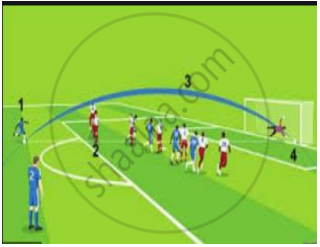Advertisements
Advertisements
Question
For the following, find a quadratic polynomial whose sum and product respectively of the zeroes are as given. Also find the zeroes of these polynomials by factorisation.
`21/8, 5/16`
Solution
Sum of the zeroes = `21/8`
Product of the zeroes = `5/16`
P(x) = x2 – (Sum of the zeroes) + (Product of the zeroes)
Then, P(x) = `x^2 – (21x)/8 + 5/16`
P(x) = 16x2 – 42x + 5
Using splitting the middle term method,
16x2 – 42x + 5 = 0
16x2 – (2x + 40x) + 5 = 0
16x2 – 2x – 40x + 5 = 0
2x(8x – 1) – 5(8x – 1) = 0
(8x – 1)(2x – 5) = 0
`\implies` x = `1/8, 5/2`
APPEARS IN
RELATED QUESTIONS
If α and β are the zeros of the quadratic polynomial f(x) = x2 − px + q, prove that `alpha^2/beta^2+beta^2/alpha^2=p^4/q^2-(4p^2)/q+2`
Find the quadratic polynomial, sum of whose zeroes is 0 and their product is -1. Hence, find the zeroes of the polynomial.
If 1 and –2 are two zeroes of the polynomial `(x^3 – 4x^2 – 7x + 10)`, find its third zero.
If 𝛼, 𝛽 are the zeroes of the polynomial f(x) = x2 + x – 2, then `(∝/β-∝/β)`
What should be added to the polynomial x2 − 5x + 4, so that 3 is the zero of the resulting polynomial?
Basketball and soccer are played with a spherical ball. Even though an athlete dribbles the ball in both sports, a basketball player uses his hands and a soccer player uses his feet. Usually, soccer is played outdoors on a large field and basketball is played indoor on a court made out of wood. The projectile (path traced) of soccer ball and basketball are in the form of parabola representing quadratic polynomial.


What will be the expression of the polynomial?
Find the zeroes of the following polynomials by factorisation method and verify the relations between the zeroes and the coefficients of the polynomials:
`4x^2 + 5sqrt(2)x - 3`
Find the zeroes of the following polynomials by factorisation method and verify the relations between the zeroes and the coefficients of the polynomials:
`v^2 + 4sqrt(3)v - 15`
If one zero of the polynomial p(x) = 6x2 + 37x – (k – 2) is reciprocal of the other, then find the value of k.
Find a quadratic polynomial whose zeroes are 6 and – 3.
